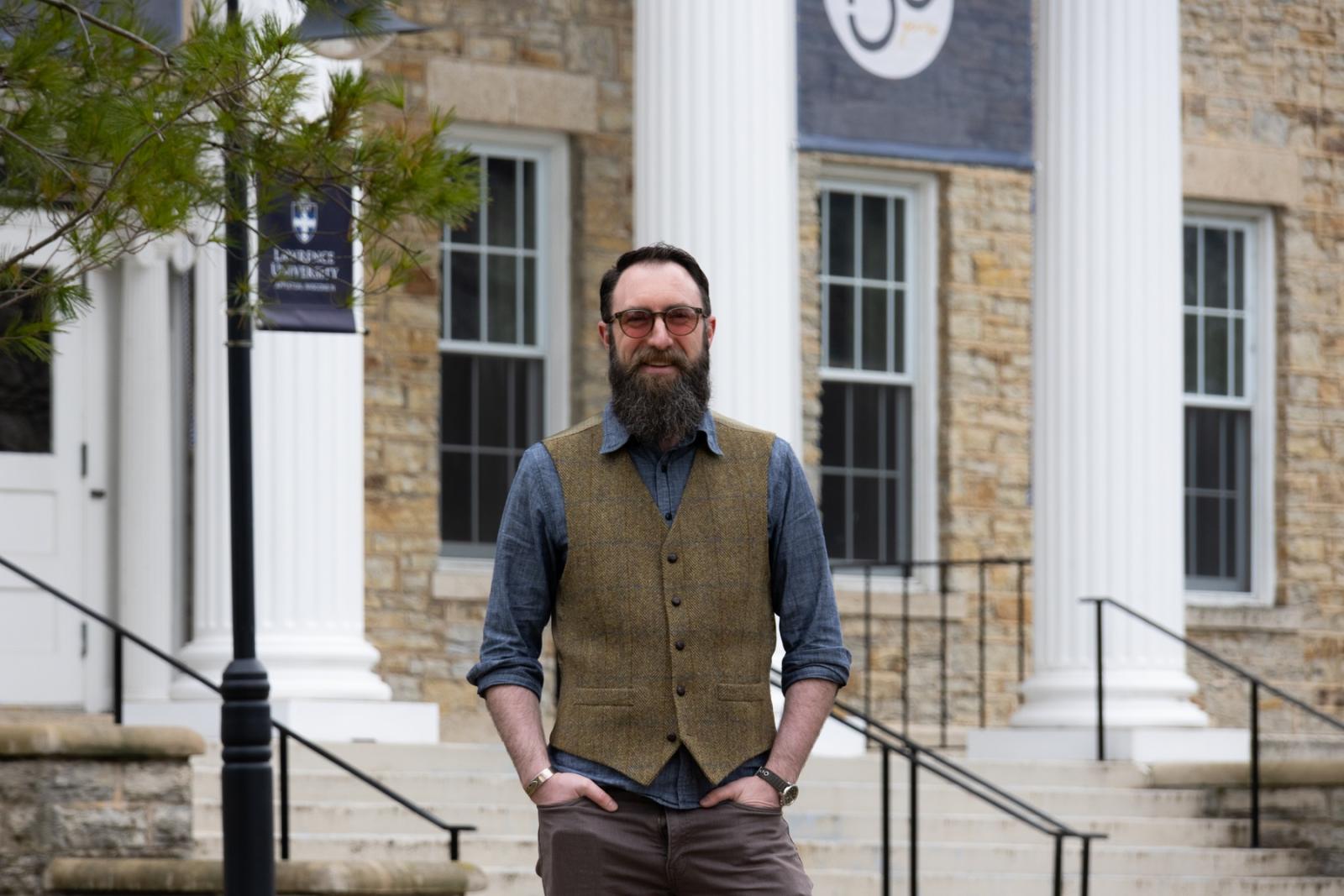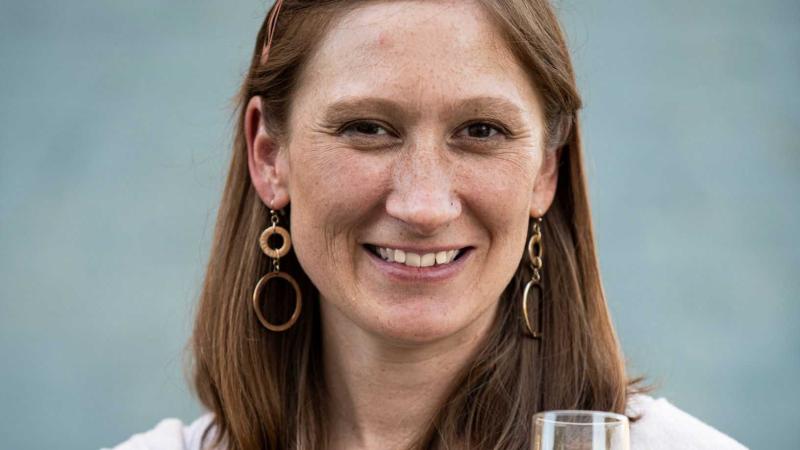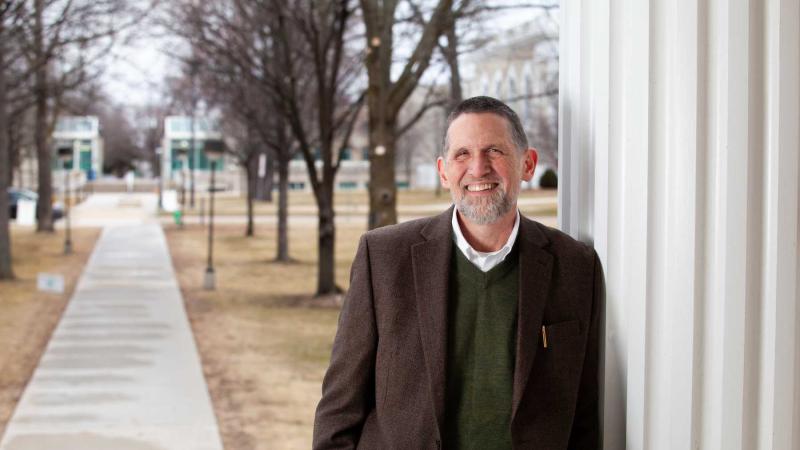About the series: On Main Hall Green With … is an opportunity to connect with faculty on things in and out of the classroom. We’re featuring a different Lawrence faculty member each time — same questions, different answers.
---
Whether in the classroom or amid the archaeological collections in Briggs Hall or in research work on the North Coast of Peru, Kurt Wilson is all about asking questions.
The assistant professor of anthropology joined the Lawrence University faculty in fall of 2024, coming to Lawrence after two years as a National Science Foundation SBE Postdoctoral Research Fellow in the Department of Geography at the University of Utah.
You’ll see humanity’s patterns, practices, and places in new lights through multidisciplinary lenses.
He holds a Ph.D. in anthropology from the University of Utah. He earned a master’s in anthropology and an M.Ed. in higher education at Iowa State University and a bachelor’s degree with a major in history from the University of Wisconsin-La Crosse.
We caught up with Wilson to talk about interests in and out of the classroom.
In the classroom
Inside info: What’s one thing you want every student coming into your classes to know about you?
Anthropology is exploration. It is about asking, interrogating, puzzling through, and answering questions. I love questions. Every class I teach is dedicated to helping students explore questions and learn transferable problem-solving and analytical tools to take forward into their future—all through better understanding the interconnectedness of humanity and our environment.
Getting energized: What work have you done or will you be doing at Lawrence that gets you the most excited?
A good colleague of mine and I are currently setting up a salvage archaeology project on the North Coast of Peru to recover scientific information from looted archaeological contexts to explore the everyday lives of everyday people during periods of significant climate and political change. The work combines ethical archaeology, big data analysis, climate reconstruction, ecological theory, student opportunities, and collaboration with local researchers, all the things that get me most excited in research.
Going places: Is there an example of somewhere your career has taken you (either a physical space or something more intellectual, emotional, or spiritual) that took you by surprise?
In the past nine years since a career change to become an archaeologist I have horse-backed into the Absaroka mountains to help investigate Indigenous land use of mountain spaces, excavated at 16,000 feet in the high Andes to understand high-elevation herding, surveyed and sampled at one of the most prominent adobe temple sites on the Peruvian north coast to explore emergence of cities and states, hiked canyons in Utah to record rock art and explore hunter-gatherer settlement, and explored many more locales. Every project I have been invited to or undertaken has been a wonderful surprise of culture, people, food, and learning.
Out of the classroom
This or that: If you weren’t teaching for a living, what would you be doing?
What I think I would like to do: voice acting. I love the way that voice actors can bring animations, novels, puppets, etc. to life and have always enjoyed trying to emulate their efforts. What I would probably be doing: data science. I do really enjoy exploring data to find the patterns, connections, and meaning that can be extracted to understand the world.
Right at home: Whether for work, relaxation or reflection, what’s your favorite spot on campus?
One of the new features on campus that I thoroughly appreciate is the world timeline that has been installed on the second floor of Youngchild. It wonderfully puts into perspective how little time we, as a lineage, have been on the planet and the deep history of the world’s existence. I also really enjoy Room 326 Briggs, which has the archaeological teaching collections, links to the anthropology collections, and is where I do most of my teaching.
One book, one recording, one film: Name one of each that speaks to your soul? Or you would recommend to a friend? Or both?
Movie: The Princess Bride. Is it a comedy? An action movie? A romance? A swashbuckler adventure? Something else? Yes, yes, it is. It is campy and it is glorious. I love the way the movie plays with mixing genres (I really like genre mixes of all kinds) and the movie just makes me happy.
Book: Small Gods by Terry Pratchett (really anything by Terry Pratchett). Terry Pratchett’s ability to mix profound insight into the human condition with comedy and fantasy is incredible. Also, Hidden Figures by Margo Lee Shetterly. The unveiling of hidden history in NASA and space flight was profoundly impactful and I find the stories of those women equal parts humbling and inspiring. A third is a single book chapter titled “Competition, conflict, and the development of social hierarchies” by James L. Boone in the 1992 book Evolutionary Ecology and Human Behavior. It fundamentally underlies my approach to exploring and understanding the emergence of inequality across humanity’s past.
Recording: I am an absolute sucker for British radio comedies, especially science fiction. The 2018-20 show Quanderhorn Xperimentations by Rob Grant and Andrew Marshall takes wonderfully over-the-top voice acting, science fiction ideas, comedy, and sets it all in the 1950s to make full use of the radio medium. It’s joyous, absurd, and quirky. Old Harry’s Game by Andy Hamilton is another that comes to mind as a socially insightful, absurd comedy that can only exist through the medium of radio. I really adore how radio can make use of simple sound effects and the magic of voice to bring vibrant worlds alive and comedy’s ability to interrogate the human condition. Finally, and this might be cheating a little bit as it also is visual, but Vincent Price’s An Evening of Edgar Allan Poe. Price’s unique voice, flair, and presentation brings to life the darker side of the human condition of multiple Poe stories.
Find more faculty profiles in the On Main Hall Green With ... series here




